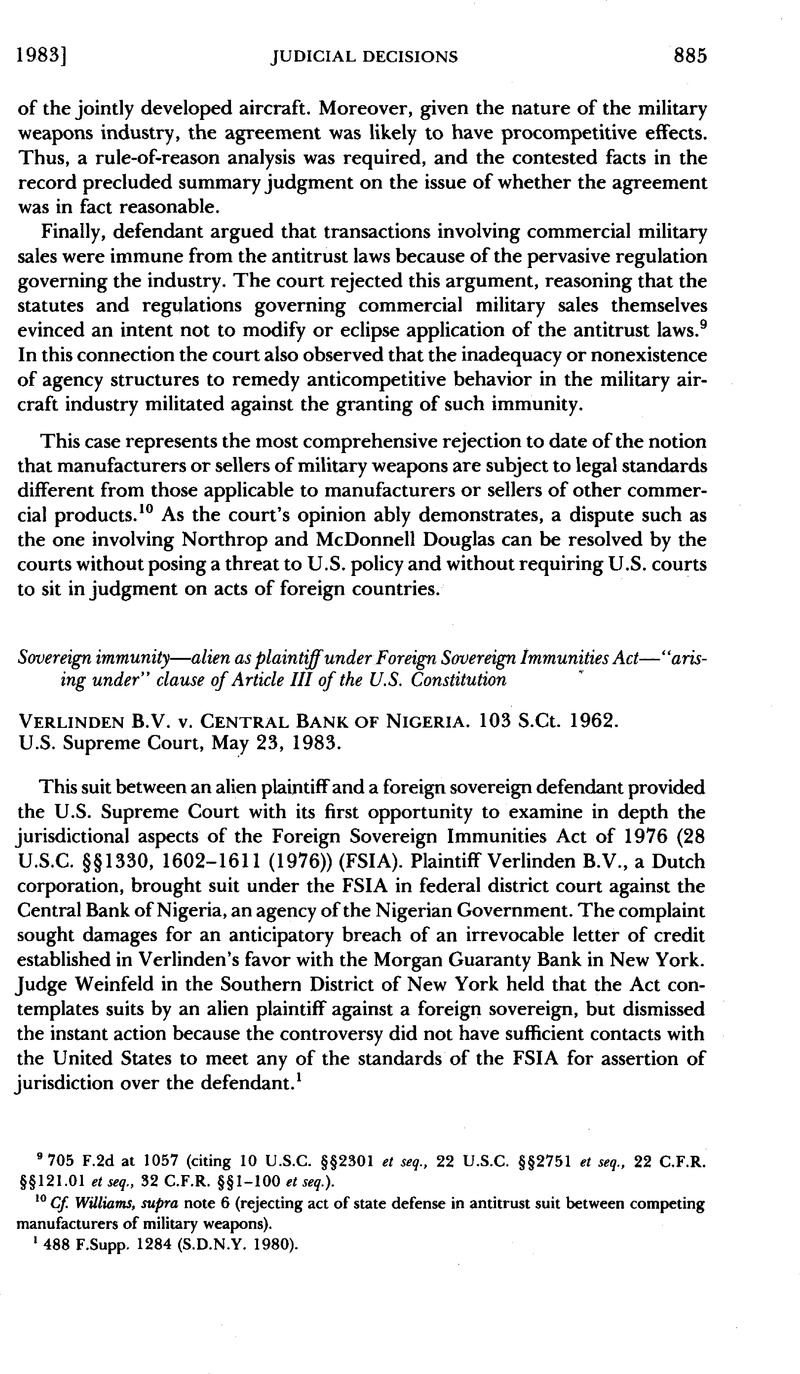No CrossRef data available.
Published online by Cambridge University Press: 27 February 2017

1 488 F. Supp. 1284 (S.D.N.Y. 1980).
2 647 F.2d 320 (2d Cir. 1981) (per Kaufman, C.J.), summarized in 75 AJIL 965 (1981).
3 The defendant Central Bank of Nigeria refused to argue before the U.S. Supreme Court. However, the Supreme Court appointed the attorney for an amicus curiae, the Republic of Guinea, to argue in support of the decision below. The Republic of Guinea has been involved in litigation raising similar issues. See Maritime Int’l Nominees Establishment v. Republic of Guinea, 693 F.2d 1094 (D.C. Cir. 1982), summarized in 77 AJIL 318 (1983).
4 103 S. Ct. 1962, 1968.
5 Ibid.
6 Ibid.
7 Ibid.
8 The FSIA contemplates that its standards will be applied in both federal and state courts. Id. at 1969. However, in view of the political sensitivity of such cases and the importance of developing a uniform body of law, the Act guarantees to foreign states the right to remove any action to federal court (28 U.S.C. §1441(d)) and specifically provides that any claim against a foreign sovereign may be brought in federal court at the outset (28 U.S.C. § 1330(a)). Ibid.
9 Ibid.
10 Id. at 1970. The Court noted that the Act also contains an exception for cases in which sovereign immunity had been waived, 28 U.S.C. §1605(a)(l), but the Court characterized this provision as “an exception to the normal pattern of the Act, which generally requires some form of contact with the United States.” Id. at 1959 n.15. The Court reserved the question whether, by waiving its immunity, a foreign state could consent to suit based on activities wholly unrelated to the United States. In addition, the Court noted that the traditional doctrine of forum non conveniens did not appear to have been affected by the Act.
11 Id. at 1971. The Court acknowledged that the relevant House report (H.R. Rep. No. 1487, 94th Cong., 2d Sess. 17 (1976)) states that sovereign immunity must be pleaded as an affirmative defense, but reasoned that, because subject matter jurisdiction turns on the existence of an exception to foreign sovereign immunity, the district court must determine that immunity is unavailable regardless of whether the foreign state enters an appearance. 103 S. Ct. at 1971 n.20. See Ipitrade Int’l v. Federal Republic of Nigeria, 465 F. Supp. 824 (D.D.C. 1978).
12 103 S. Ct. at 1971–72 (citing Louisville & Nashville R. Co. v. Mottley, 211 U.S. 149 (1908); Gully v. First Nat’l Bank, 299 U.S. 109 (1936)).
13 103 S. Ct. at 1972–73 (citing Mossman v. Higginson, 4 U.S. (4 Dall.) 12 (1800); The Propeller Genesee Chief v. Fitzhugh, 53 U.S. (12 How.) 443, 45–53 (1852)).
14 103 S. Ct. at 1973.
15 Ibid.
16 In this regard, the Court noted that the court of appeals had upheld jurisdiction in several related cases in which it found a “direct effect” on the United States from Nigeria’s commercial activity. See, e.g., Texas Trading & Milling Corp. v. Federal Republic of Nigeria, 647 F.2d 300, 310–13 (2d Cir. 1981), cert, denied, 454 U.S. 1148 (1982), summarized in 75 AJIL 968 (1981). However, the Court stressed that these cases involved claims by American suppliers operating within the United States. 103 S. Ct. at 1974.